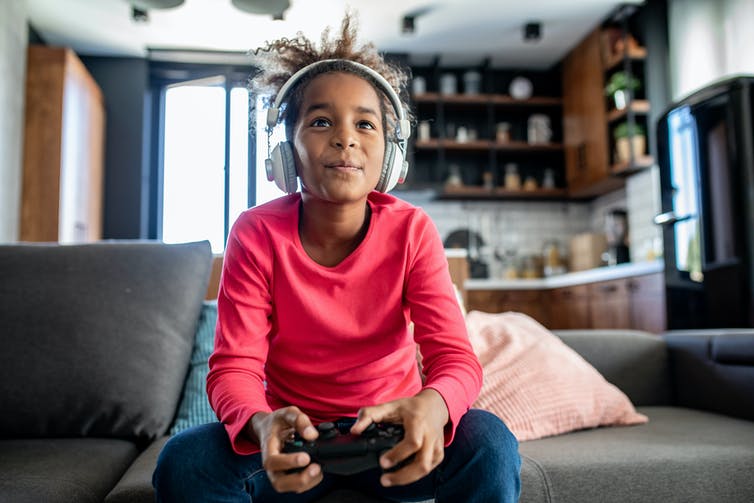Is gaming good for kids?

In addition to being fun, video games can build real-world skills. Carol Yepes/Moment via Getty images

Curious Kids is a series for children of all ages. If you have a question you’d like an expert to answer, send it to CuriousKidsUS@theconversation.com.
My parents are always saying there’s so much bad stuff about video games, but is there any good stuff? – Ethan B., age 12, Geneva, Ohio
Gamers, have you ever noticed that you’re the first person to spot animals at the zoo? Or if someone drops candy on the ground, you know exactly where every piece landed? That may be because you play video games.
Research has shown people who play video games like Fortnite or Rocket League have higher visual acuity, meaning they can keep track of multiple moving objects at once – or even see things in the fog or rain that others cannot. It’s one of the many benefits researchers like me have discovered about playing video games.
For those who think video games are a waste of time or a negative force in your life, it might be worth showing them what the latest science has to say.
Developing skills
When you keep an eye on your enemies, grab the best loot and change your inventory without even looking at the controller, you are essentially flexing your brain. Your brain loves challenges like this – and can actually grow from playing video games. It is one reason why video game players make better surgeons and why some doctors even use video games to warm up before big surgeries.
Video games can develop other skills, too. For example, they can teach you to never give up, no matter how many times it takes to beat the final boss or reach the next level. The persistence you use in video games shows that hard work will help you achieve your goals, both inside and outside the video game.

Your brain on video games is hopping.
Riska/E+ via Getty Images
To succeed in video games, you can’t just work harder; you have to work smarter, too. Beating the final boss or another really good player is not as simple as using the same strategy over and over again. Instead, video games train you to solve problems by considering and trying different solutions.
Think about your favorite games. They give you lots of different problems with multiple solutions, which makes you realize solving problems can be really fun. Playing video games can teach you critical thinking skills that, combined with hard work, will bring you a lot of success.
One of the very best things about playing video games is the friends – not just the new friends you make, but hanging out with your old friends, especially during times when you may not be able to see them at school or at their house. Video games provide friends a digital playground where helping and sharing is encouraged and often required. Helping each other build the biggest and best fort – or reviving a teammate when they’re down – strengthens friendships and can even help mend broken ones.
That’s because, even if it’s “just a game,” teammates who help each other in video games are more likely to help each other in the real world and be more helpful toward strangers, too. Experiencing the benefits of being a team player teaches you the value of teamwork, which is something you can use for the rest of your life. If, however, you use video games to be mean to others – or let mean video game players stick around – you’ll miss out on most of these benefits.

Sweet victory often involves teamwork.
martin-dm/E+ via Getty Images
Applying skills to real life
While you can turn on a video game and quickly feel powerful, in charge and popular, it’s good to remember games are a little like playing life on the easiest settings. Real life tends to be more challenging.
But think about how you get bored playing a game on the easiest setting – and how it suddenly becomes fun again when you increase the difficulty. For the same reason, life can be more rewarding than video games.
Take learning how to play an instrument, for example. I found that learning how to play a guitar is way harder and more frustrating than playing Rock Band on the hardest setting. But it’s so much more fun to shred a guitar in real life than it is to play one on Rock Band.
So enjoy developing your skills by playing video games. But also ask yourself: Are you up for the challenges waiting for you outside video games?
Hello, curious kids! Do you have a question you’d like an expert to answer? Ask an adult to send your question to CuriousKidsUS@theconversation.com. Please tell us your name, age and the city where you live.
And since curiosity has no age limit – adults, let us know what you’re wondering, too. We won’t be able to answer every question, but we will do our best.

John Velez receives funding from the National Endowment for the Arts (Award#: 1855516-38- C-19).




